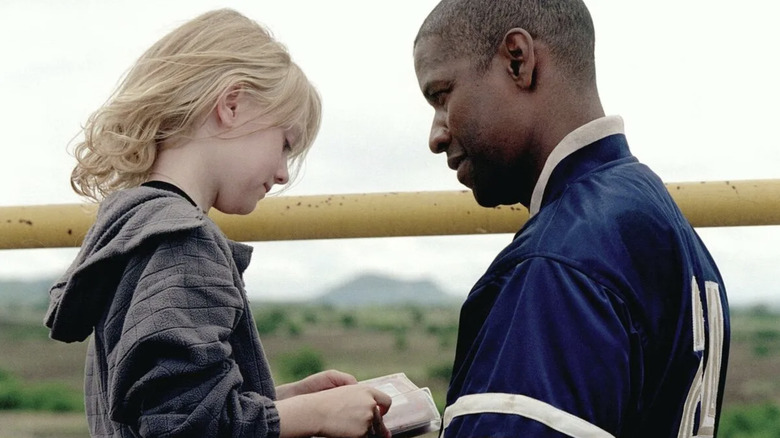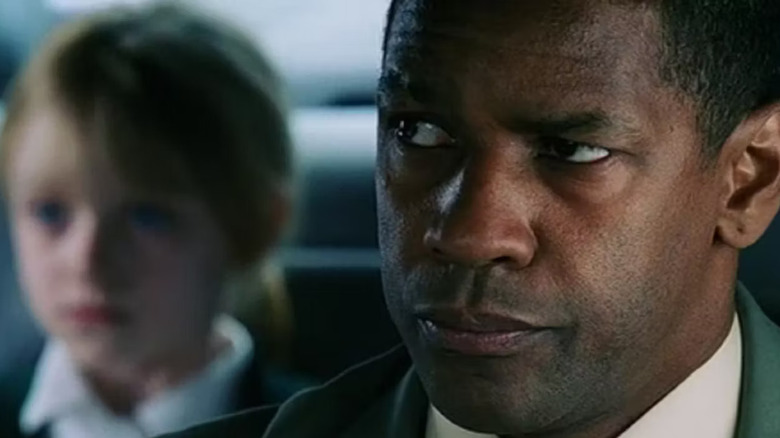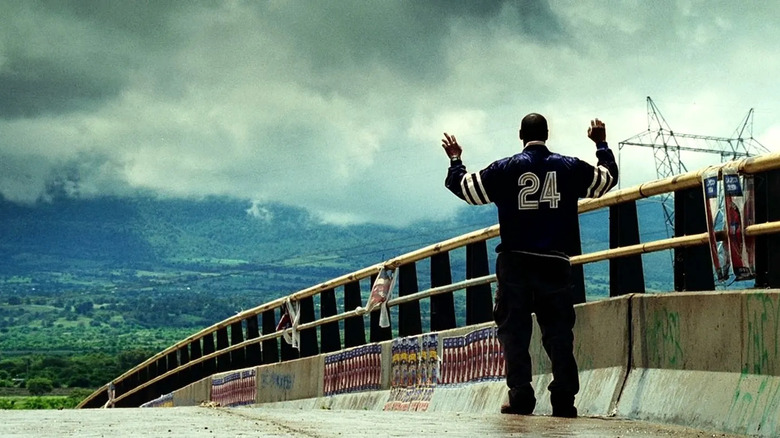One Of Denzel Washington's Most Beloved Films Has A Surprisingly Low Rotten Tomatoes Score
As Marty McFly once prophetically claimed after his game-changing appearance at 1955's Enchantment Under the Sea dance, "I guess you guys aren't ready for that yet. But your kids are gonna love it." This phrase pretty perfectly sums up the phenomenon of reappraisal in the arts, especially cinema. Whether a film is truly something pioneering and ahead of its time, or whether it's just lost in the shuffle due to extenuating circumstances, the (relative) immortality of movies allows them to be periodically rediscovered and newly appreciated for what they are, once removed from the weight of expectation and other contemporary factors. This doesn't just happen to films that fly under the radar, either; even the most high-profile releases, movies featuring A-list megastars made by big name directors, can initially receive a tepid response only to become bonafide classics years, perhaps even decades, later. For examples of this, just take a gander at any "Best Of" list published in the last 20 years; chances are, you'll find films like John Carpenter's "The Thing" and Ridley Scott's "Blade Runner" on them, two movies that infamously bombed upon their release only to be widely regarded as classics today.
Ridley's brother, Tony Scott, sadly left us back in 2012, and thus has not been able to enjoy the wave of appreciation that his filmography has garnered during the last 12 years. It'd be wrong to say that Scott was unappreciated during his lifetime; after all, he was the filmmaker behind such megahits as "Top Gun," "Beverly Hills Cop II," and "Crimson Tide." The latter film began what proved to be his most fruitful cinematic partnership when it came to actors, pairing him with Denzel Washington, who ended up starring in four other films for Tony: "Déjà Vu," "The Taking of Pelham 123," "Unstoppable," and "Man on Fire," which is generally regarded as the pairing's masterpiece. Sadly, this wasn't the consensus when the film was first released in April of 2004: The movie's Rotten Tomatoes aggregate score is a dismal 39% Rotten. Yup, many critics hated the film at the time, with the likes of Nathan Rabin (writing for AV Club) describing it as an "exercise in assaultive excess" and "a drunken houseguest who won't leave."
Fortunately, this is not an opinion shared by most in 2024, as Scott and Washington's "Man on Fire" currently has a 7.7 on IMDb, a 3.7 on Letterboxd, and made /Film's #7 spot on our "The 21 Best Denzel Washington Movies" list. The reason for this disparity comes down to personal taste, of course, but it also indicates just how ahead of his time Scott was when making the film.
Critics took issue with the violence of Man on Fire
A large number of the negative reviews from professional critics who contributed to that 39% Rotten score are folks who seem to have been turned off by the violence in "Man on Fire," a quality that neither Scott, Washington, nor writer Brian Helgeland shied away from when making the movie. Adding insult to that injury for them is Scott's increasingly experimental style, something the director had been building up to over the course of his last several films (if not his entire career) but which really came into its own here. Scott, cinematographer Paul Cameron, and editor Christian Wagner make the film into a tapestry of memory, emotion, and immediate sensory overload, all the better to put us in the headspace of John Creasy (Washington) as he first tries to bodyguard the daughter (Dakota Fanning) of a wealthy Mexican man, and then attempts to find and/or avenge her after she's kidnapped for ransom. Scott makes "Man on Fire" intentionally abrasive, blending moments of beautiful photography and idyllic calm with harrowing violence, tension and, ultimately, tragedy.
This is in contrast to the way A.J. Quinnell's source novel was initially adapted into a movie in 1987 by French director Élie Chouraqui, which is much more aesthetically pleasant than Scott's film (Chouraqui's style was akin to the Cinéma du look movement of the period). The story goes that Scott was originally going to adapt the novel in the mid-'80s before "Top Gun" came his way, and thus had many years to mull over what he'd do with the material. That's partially why his "Man on Fire" is 146 minutes long (the length being another point of contention with the contemporary critics), but Scott doesn't waste a moment of that runtime, especially as Washington holds the screen with his mix of magnetism and brooding interiority.
Tony Scott was on fire making Man on Fire
"Man on Fire" is indeed a lot of movie: part surrogate parent/child love story, part revenge thriller (the film acts almost like a precursor to Washington's "The Equalizer" series), and part melancholic character study. Its brutality is, indeed, the point, as Scott wants the violence committed by Creasy to be as questionable as it is exciting and cathartic, the film being made with its eyes open in the wake of 9/11 and the US government's subsequent response to terrorism.
Although the initial critical response to the movie was poor, it seems audiences were on board with it fairly early, as the film's CinemaScore was a happy A-. Since then, more people have discovered the movie and been vocal about their appreciation for it, holding it up as a highlight even amongst Scott's generally well-regarded filmography. In a way, the movie itself seems to contain Scott's sly acknowledgement of what good work he and Washington were doing while making it. During one scene where Creasy's friend Paul (Christopher Walken) is being interrogated about Creasy, the man explains: "A man can be an artist in anything, food, whatever. It depends on how good he is at it. Creasy's art is death. He's about to paint his masterpiece." Tony Scott and Denzel Washington's art is cinema, and with "Man on Fire," they painted a picture that only continues to grow in popularity.


